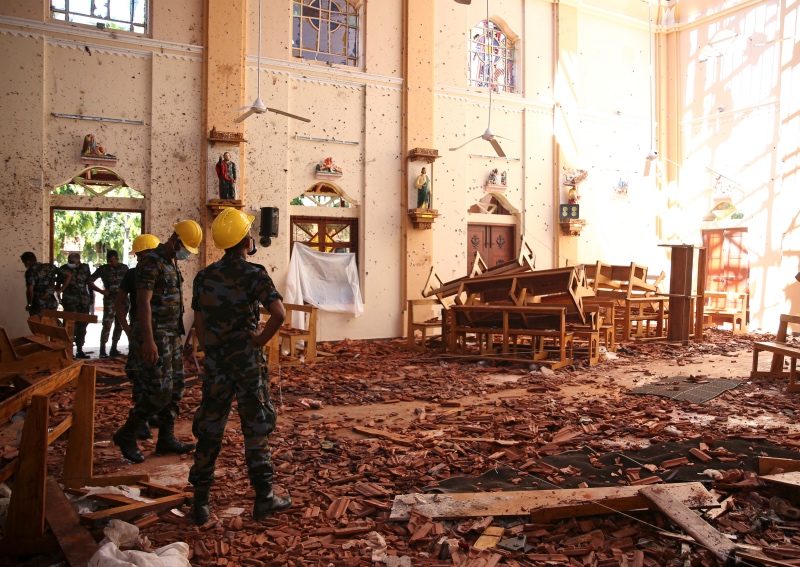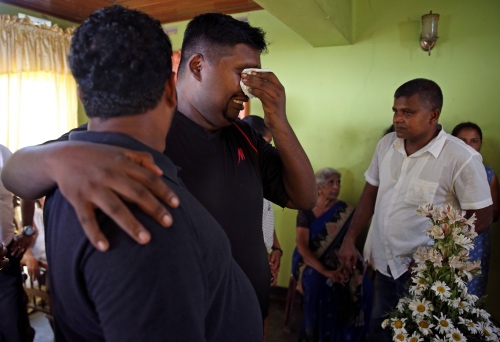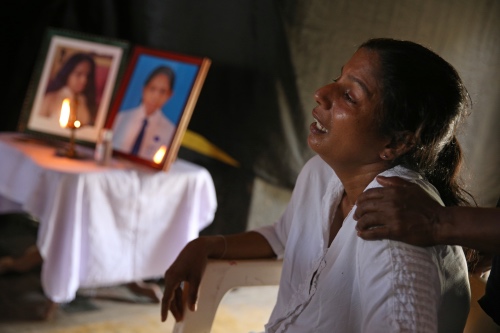Colombo, Sri Lanka
Reuters
Sri Lanka said on Monday it was invoking emergency powers in the aftermath of devastating bomb attacks on hotels and churches, blamed on militants with foreign links, which killed 290 people and wounded nearly 500.
The emergency law, which gives police and the military extensive powers to detain and interrogate suspects without court orders, went into effect at midnight local time, the president’s office said.



From top – A view of the damage at St Sebastian Catholic Church, after bomb blasts ripped through churches and luxury hotels on Easter, in Negambo, Sri Lanka, on 22nd April; Friends and relatives mourn for Mary Noman Shanthi, 58, and Rohan Marselas Wimanna, 59, who died as bomb blasts ripped through churches and luxury hotels; The mother of Shaini, 13, who died as bomb blasts ripped through churches and luxury hotels on Easter, mourns at her wake, in Negombo. ALL PICTURES: REUTERS/Athit Perawongmetha
Colombo, the seaside capital of the Indian Ocean island, was jittery the day after the horrifying Easter Sunday attacks. Police said 87 bomb detonators were found at the city’s main bus station, while an explosive went off near a church when bomb squad officials were trying to defuse it. Scores were killed in the church on Sunday.
A night curfew went into effect at 8pm.
There was no claim of responsibility for Sunday’s attacks but suspicion was focusing on Islamist militants in the Buddhist-majority country.
Investigators said seven suicide bombers took part in the attacks while a government spokesman said an international network was involved.
Police had received a tip-off of a possible attack on churches by a little-known domestic Islamist group this month, according to a document seen by Reuters.
The intelligence report, dated 11th April, said a foreign intelligence agency had warned authorities of possible attacks on churches by the National Thawheed Jama’ut. It was not immediately clear what action, if any, was taken in response to the tip-off.
International anti-terrorism experts said even if a local group had carried out the attacks, it was likely that al-Qaeda or Islamic State were involved, given the level of sophistication.
Two of the suicide bombers blew themselves up at the Shangri-La Hotel on Colombo’s seafront, said Ariyananda Welianga, an official at the government’s forensic division. The others targeted three churches and two other hotels.
A fourth hotel and a house in a suburb of the capital Colombo were also hit, but it was not immediately clear how those attacks were carried out.
“Still the investigations are going on,” Welianga said.
Police said 24 people had been arrested, all of whom were Sri Lankan, but they gave no more details.
Most of the attacks came during Easter services and when hotel guests were sitting down for breakfast buffets.
“Guests who had come for breakfast were lying on the floor, blood all over,” an employee at Kingsbury Hotel told Reuters.
Cabinet spokesman Rajitha Senaratne said the government believed an international network was involved.
“We don’t think a small organisation can do all that. We are now investigating international support for them and their other links – how they produced the suicide bombers and bombs like this,” he said.
The President, Maithripala Sirisena, said the government would seek foreign help to track overseas links.
US President Donald Trump called Prime Minister Ranil Wickremesinghe to pledge US support in bringing the perpetrators to justice, a White House spokesman said.
“A terrible, terrible thing. Unthinkable,” Trump later told reporters at a White House event. “We are working with Sri Lanka.”
Pope Francis deplored the attacks and called for universal condemnation of what he said were “terrorist acts, inhuman acts” that could never be justified.
Buddhist-majority Sri Lanka was at war for decades with ethnic minority Tamil separatists, most of them Hindu, but violence had largely ended since the government victory in the civil war 10 years ago. The country’s 22 million people include minority Christians, Muslims and Hindus.
Most of the dead and wounded were Sri Lankans although government officials said 32 foreigners were killed, including British, US, Australian, Turkish, Indian, Chinese, Danish, Dutch and Portuguese nationals.
Denmark’s richest man Anders Holch Povlsen and his wife lost three of their four children in the attacks, a spokesman for his fashion firm said.
A British mother and son were killed while eating breakfast at the Shangri-La, British media reported, while five Indian political workers were killed at the same hotel.
The US State Department said in a travel advisory “terrorist groups” were plotting possible attacks in Sri Lanka and targets could include tourist spots, transport hubs, shopping malls, hotels, places of worship and airports.
Traffic was uncharacteristically thin in normally bustling Colombo on Monday.
Soldiers with automatic weapons stood guard outside major hotels and the World Trade Centre in the business district.





